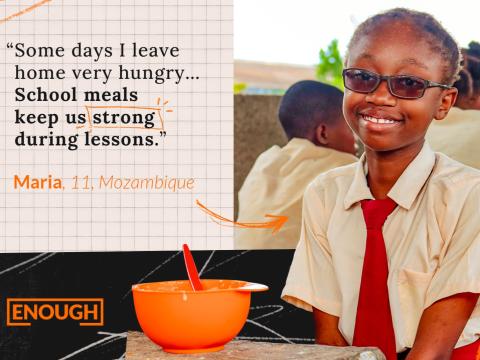How school meals help Maria stay in school

“It’s very simple to prepare,” explains Maria, an 11-year-old student in Mozambique. “My school serves meals. It is a kind of porridge called fuba.”
She describes the process, “It's kept in small bags. We put the water in, put in a little of the porridge and stir until it starts to boil a little. Leave it for a while, then stir again. Then students are called to line up and receive their school lunch.”
Though simple to prepare, the benefits of school meals are anything but simple for Maria and her classmates.
"I enjoy my school meals because they keep me going through the day, with energy, while I am in school, until the moment I return home,” says Maria. About her classmates, she says they feel the same way. “For some of them, for one reason or another, they may not have meals at home. But when the morning comes, they are motivated to go to school knowing for sure that they will enjoy a nice hot plate of porridge.”
Estefânia, a teacher at Maria's school, points out that the meals encourage students to stay in school longer, especially those from poorer or more vulnerable families. “Usually, those children would not be able to go to school because of hunger and the many difficulties they go through,” she says.
When children are given school meals, they are more likely to attend school. Studies have shown school meal programmes can increase enrolment by an average of 9%.
“The parents and all involved are very grateful,” Estefânia says.
The health benefits of school meals extend to the children’s homes as well.
For the most vulnerable families, providing food for children can be too great a burden, resulting in children being pulled out of school to work. For girls, they are at higher risk of forced marriage, early pregnancy, and gender-based violence.
Having children receive a nutritious school meal can be a vital lifeline, ensuring children stay in school and have healthy mental and physical development.
Maria expects to stay in school a good deal longer, dreaming one day of being a doctor. School meals are essential in supporting the dreams of children like Maria.
“When I grow up, I would like to be a doctor, because I like the profession and I like helping others.”
We have ENOUGH. We believe every child should have access to at least one healthy and nutritious school meal every day.
World Vision stands alongside children in calling for Governments to expand the coverage of healthy and nutritious school meals.